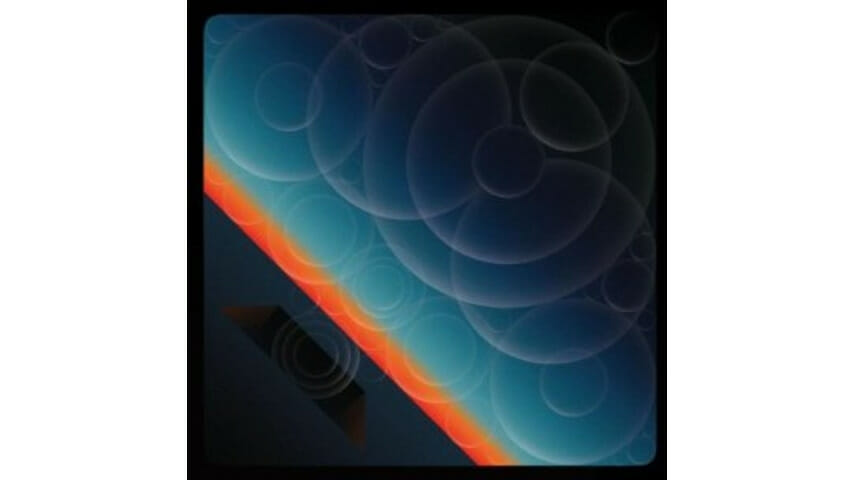
The Mars Volta have made a career out of creating intricate, highly conceptual music that confounds just as much as it intrigues. The group’s records are usually intended to be examined as a whole rather than on a track-by-tack basis, and they can rarely be properly digested on a first listen. Thus far, the band has been successful at producing some of the most challenging-yet-rewarding albums in recent memory. With their sixth LP Noctourniquet, The Mars Volta seem to be traveling down the same path, producing a record that is most definitely challenging. The question is whether or not it will prove rewarding as well.
Even die-hard Volta fans will be surprised by the first few seconds of the album, which feature probably the most clean, melodic series of notes the band has ever played. But before too long, “The Whip Hand” rips into the familiar, grungy guitar sounds and bizarre time signature The Mars Volta have become known for. However, despite the immediately ear-catching intro, the rest of the track proves to be one of the band’s weakest album openings. It lacks the spellbinding qualities of “Cygnus…Vismund Cygnus” or “Vicarious Atonement” or the frenzy of “Aberinkula.” And lyrics like “I am a landmine / So just don’t step on me” simply don’t quite hold up against gems like “Please dismantle all these phantom limbs.”
Noctourniquet quickly saves face with the next track “Aegis” (which, according to Greek mythology was the name of Athena and Zeus’s shield). But as the record progresses through the first half, the songs continue to alternate between mediocre prog-rock and the kind of ingenious, engrossing, mindfuck compositions that make up the band’s repertoire.
Then right around the middle of the album, Noctourniquet finds its footing with “In Absentia.” The song starts with what sounds like 8-bit gothic church music—like something from the soundtrack to the original Castlevania. A repeated keyboard note reminiscent of Nilsson’s “One” holds tight while Cedric Bixler-Zavala’s voice struggles to be heard among the pounding drums and a synthetic choir of demons. At about the halfway point, the song seems to completely change, becoming a slow, steady groove while a funky synth line meanders from one ear to the other.
If there is an immediately noticeable change in The Mars Volta’s sound with Noctourniquet, it’s the addition of prominent synth parts to the mix. The majority of the songs feature some sort of synth and in a way that benefits the music—always adding to the dynamic, rather than distracting from the soul of the song. The band has typically been prone to experimentation, and it seems like they have found another sonic quality to add to their already grandiose and diverse musical bag of tricks.
The Mars Volta’s previous LP Octahedron also featured a good amount of synth, but the effect was much more subtle—most of songs were connected with a sustained synth chord rather than flowing one into the other, a trait common in the band’s previous albums. In a lot of ways, Noctourniquet is a companion album to Octahedron. Both records are a lot more subdued and straightforward than The Mars Volta’s previous work, and several of Noctourniquet’s songs resemble tracks from Octahedron like “With Twilight as My Guide” and “Since We’ve Been Wrong.” Even some of the harder-hitting tunes still feel restrained and down-tempo.
My only fear with the trend of the last two albums is that The Mars Volta are getting too comfortable in their own skin, that they’re settling for an easy parody of themselves. I don’t mind the simpler approach—it worked wonders for Octahedron and does the same, in some places, for Noctourniquet as well—but I just hope it doesn’t become a way out of making bewildering and thought-provoking music. A lot of the lyrics on Noctourniquet seem like cheap rip-offs of songs the band already recorded for previous albums: Take “All the traps in the cellar go clickety-clack cause you know I only set them for you” from the new LP’s lead single “The Malkin Jewel” versus “Happened on a respirator in the basement / Are they gone? Are they gone?” from De-Loused in the Comatorium. Here we have two lyrics from separate albums that paint the picture of an ominous “basement” or “cellar.” C’mon guys! Even the album’s title recalls the song “Tourniquet Man” form The Bedlam in Goliath or the word-fusing nature of The Mars Volta’s third record title, Amputechture.
The band hasn’t fallen from grace yet, but they have strayed. Noctourniquet is not the band’s best effort, but it is pleasing and interesting. It’s definitely a little challenging and ultimately rewarding—if you can get past the clunky first half. And, as with every album from The Mars Volta, I’m sure it will reveal more with each listen, perhaps even more than this reviewer would expect after initial spins.